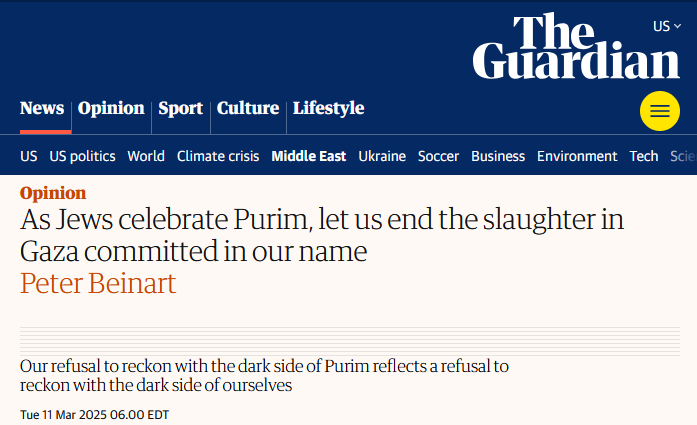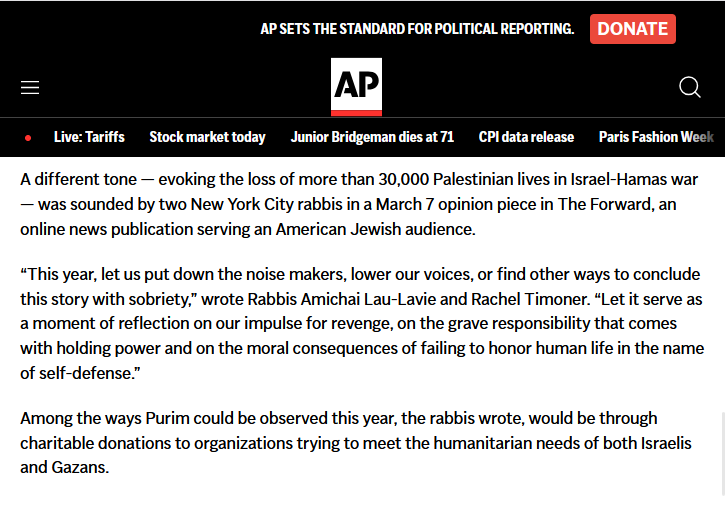Anti-Israel Activists Distort Jewish Holiday of Purim to Undermine Jewish Self-Defense
From ancient Persia to modern times, Purim teaches that Jews have the right to fight for their survival against those who would erase them
Purim commemorates one of the earliest recorded attempts to exterminate the Jewish people—a genocidal plot that was ultimately thwarted by Jewish resilience and unity. It is a story of survival, courage, and the right to self-defense in the face of oppression. However, in recent years, some have attempted to distort Purim’s meaning, falsely portraying it as a celebration of vengeance rather than a historical account of Jewish resistance against extermination.
The Misrepresentation of Purim: A Pattern of Antisemitic Distortions
Over the years, bad-faith actors have sought to weaponize the meaning of Purim, falsely portraying Jews as vengeful and bloodthirsty. This tactic has been used repeatedly to delegitimize Jewish survival and resistance.
One prominent example is a recent article from The Guardian by Peter Beinart, which attempts to draw a misleading connection between Purim and the war in Gaza—an armed conflict triggered by the October 7 attack, in which Palestinian terrorists murdered 1,200 Israelis and took over 250 more hostage. The article frames Jewish self-defense as blood-lust, echoing historical efforts to distort Jewish resistance.

Similarly, The Forward has contributed to these distortions. A widely quoted Forward article, even cited by the Associated Press, attempts to frame Purim in the context of Israel’s conflict with Hamas in a way that misrepresents Jewish self-defense as an act of genocide. This follows a familiar pattern of equating Jewish survival with aggression, reinforcing harmful narratives that have been weaponized against Jews throughout history.

This type of rhetoric has long been used to misrepresent Purim, casting Jewish self-defense as aggression rather than necessity. A 2016 article from Jewish Voice for Peace sought to reframe the Purim story as one of unjust violence, disregarding its historical context entirely.
Beyond journalism, academia has also played a role in this distortion. The book Reckless Rites by Elliott Horowitz, published by Princeton University Press, attempts to frame Purim as a holiday for gleeful anti-Christian violence. This work misrepresents Jewish history and bases its arguments on actual medieval blood libels, lending undue credibility to antisemitic interpretations.
Such narratives mirror antisemitic tropes dating back to Nazi Germany, where propaganda demonized Purim as evidence of supposed Jewish cruelty. As documented by Mishpacha, the Nazis twisted the holiday’s meaning to portray Jews as conspirators and murderers, reinforcing their own genocidal ideology. Today, these distortions persist in different forms, perpetuating a dangerous pattern of vilifying Jewish self-defense.
A Double Standard in Resistance
Some argue that these distortions of Purim exemplify a broader double standard: while resistance against oppression is widely celebrated, Jewish self-defense is often vilified. Many who champion the right of other persecuted groups to fight for their survival conveniently condemn Jewish efforts to do the same. The popular ethos of "punching Nazis" is lauded—unless it is Jews standing up against their oppressors.
Purim is not about seeking vengeance; it is about the fundamental right to exist and defend oneself against those who seek annihilation. The suggestion that a people who have endured repeated attempts at genocide should not commemorate their survival is not just absurd—it is malicious.
The Enduring Message of Purim
Purim remains a powerful reminder that Jews have historically faced oppression with resilience. It teaches the necessity of unity in the face of existential threats and reaffirms the right to self-defense. Historians and scholars emphasize that Purim is, above all, a commemoration of Jewish survival—a theme that continues to resonate in contemporary discussions about persecution and resistance. Rather than allowing bad-faith actors to distort its meaning, Purim should be recognized for what it truly is: a celebration of the enduring strength of the Jewish people.




The woke world has also attempted to distort completely the message of the Passover Seder as well
A Homeland called Chelm as the regressive iteration for the erev Rav awaits, where though? They must go